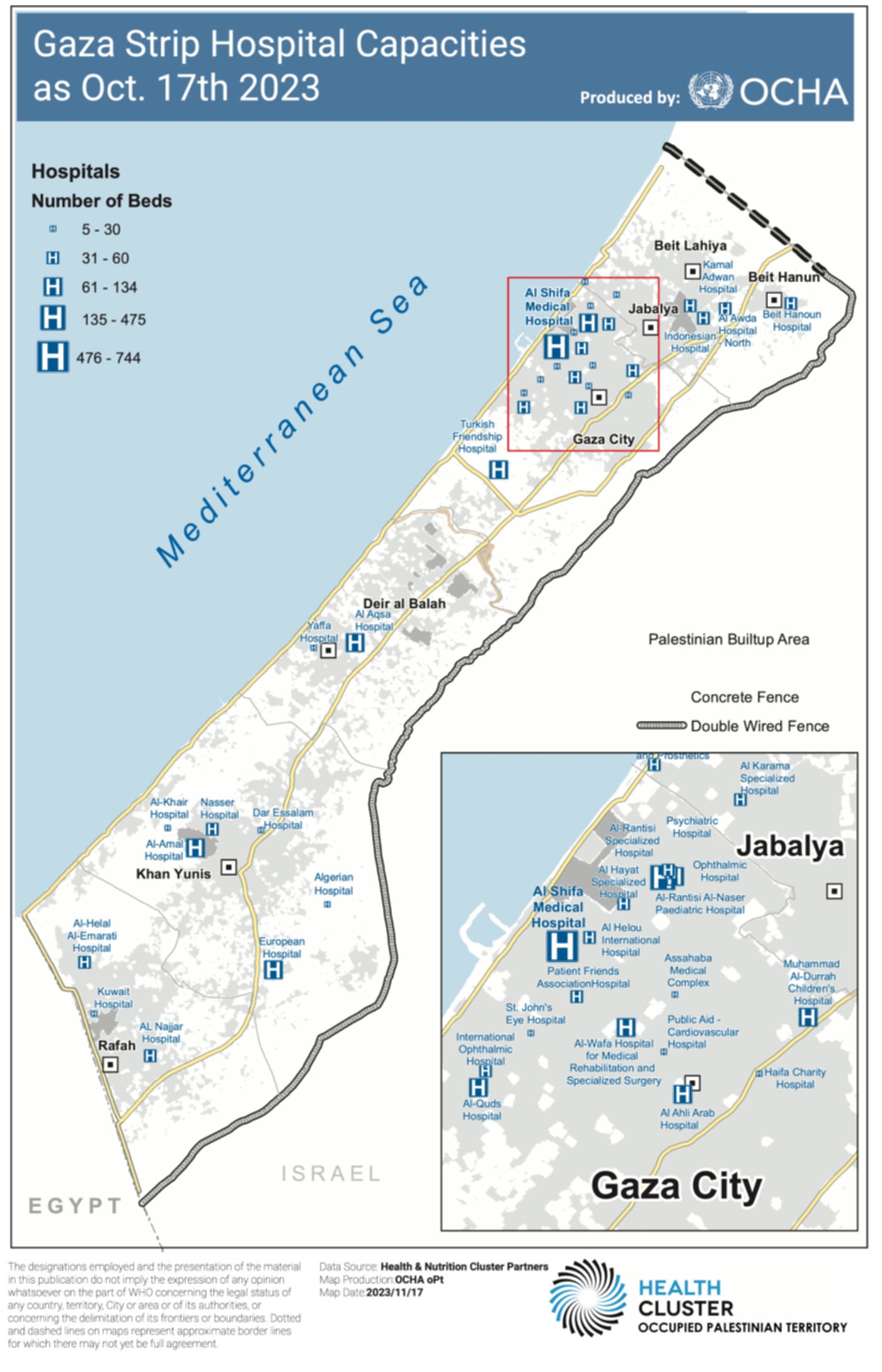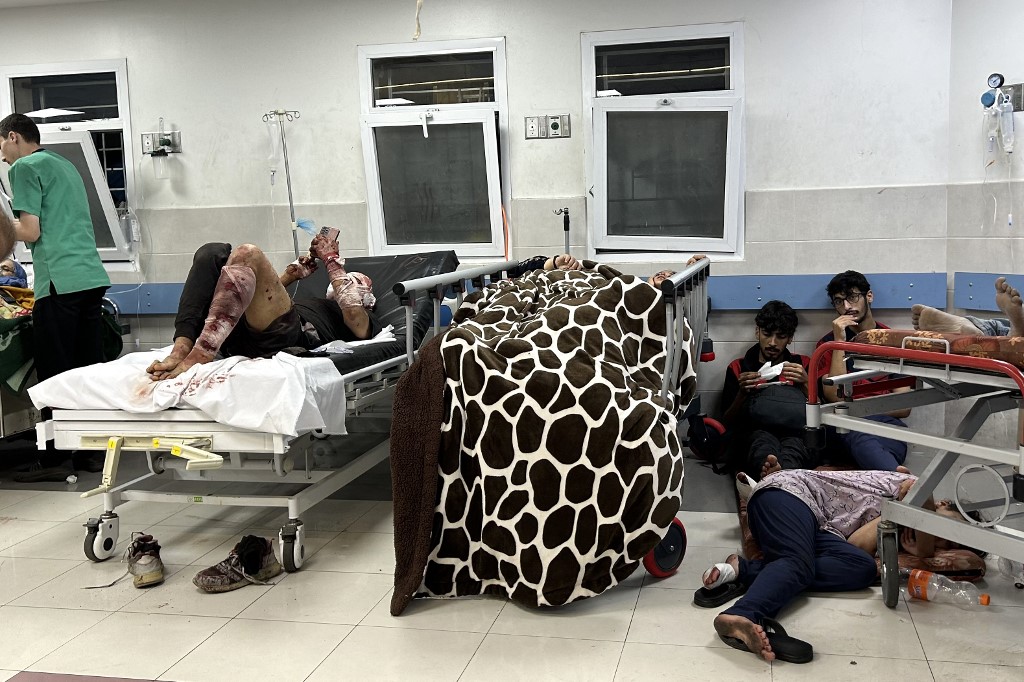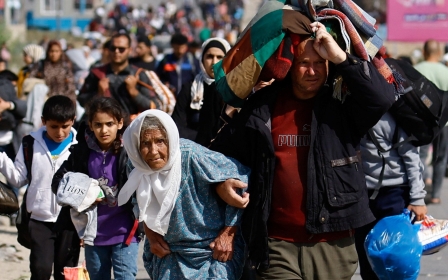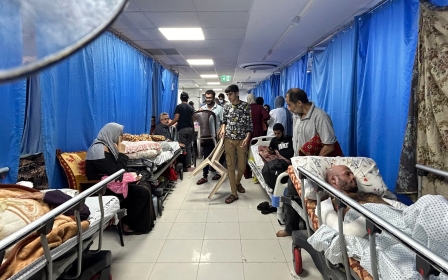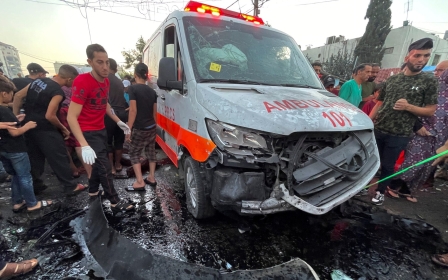Israel-Palestine war: Doctors forced to flee Al-Shifa hospital to southern Gaza recount 'terrifying' journey
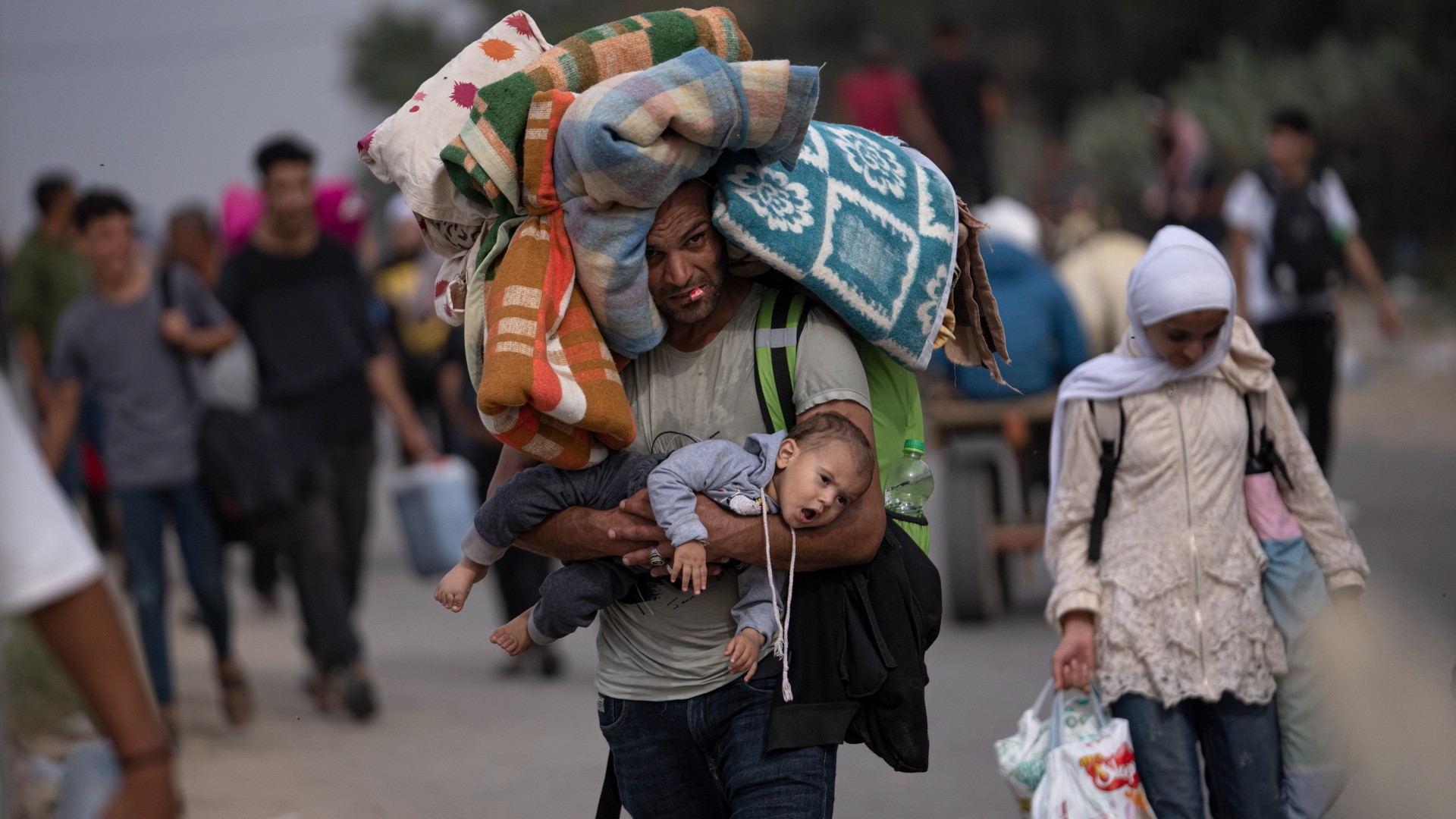
Gaza's biggest medical complex, al-Shifa, has been under Israeli siege and bombardment since 9 November, forcing a number of doctors and civilians to flee the facility, which has been declared "out of service" by health officials.
Amongst those who fled is Palestinian surgeon Haya al-Sheikh Khalil, who had not left the facility since the beginning of the Israeli onslaught on the Gaza Strip over a month ago, until Friday, 10 November, when a military invasion of the building seemed imminent.
She told Middle East Eye that she left the hospital along with her two brothers, a number of female doctors and many displaced civilians after an Israeli ultimatum to evacuate by Friday afternoon.
Khalil said that on Thursday night, Israeli forces targeted the specialisations building with missiles and tank shells, along with the outpatient clinics building and the obstetrics and gynaecology building.
Despite the risk of death, a large number of doctors refused to abandon the wounded, who are unable to evacuate the hospital due to their critical conditions.
New MEE newsletter: Jerusalem Dispatch
Sign up to get the latest insights and analysis on Israel-Palestine, alongside Turkey Unpacked and other MEE newsletters
"I cannot comprehend the atrocities committed by the Israeli occupation in al-Shifa hospital, a facility housing a very large number of wounded individuals and civilian doctors who have left their homes and families to provide care," Khalil said.
She said that many of the patients in al-Shifa have lost their entire families, leaving them without anyone to attend to their needs. The urgency of their situation requires transportation by ambulance, she said, yet ambulances are scarce in the Gaza Strip, with many of them having been bombed and additional ambulances unable to reach the hospital.
"Most of the cases I have operated on are children, who are now left without adequate medical staff, no medical materials, no electricity and no fuel. They are literally left to die," Khalil said.
Follow MEE's live coverage on the Israel-Palestine conflict
Palestinian health officials say at least seven patients on life support have died since the siege on al-Shifa started on Friday, including two babies. Their deaths were the result of ventilators and infant incubators failing to work due to lack of electricity.
On Sunday morning, the Palestinian health ministry's director-general in Gaza, Dr Munir al-Borsh, told reporters that around 40 displaced people in the hospital attempted to leave through the main gate but were shelled by an Israeli tank stationed on the adjacent road.
Their bodies remained strewn on the street, as ambulance and staff, who were less than 100 metres away, could not get to them as Israeli forces shot at anyone who moved.
Borsh said that Israeli forces also bombed the water wells in the medical complex overnight. Only one well is operating on Sunday, providing the equivalent of 12 cups of water per hour for 15,000 people trapped inside.
The intensive care unit was hit again after being struck 24 hours earlier, he said.
The World Health Organisation (WHO) said on Sunday morning that it has lost communication with its contacts at al-Shifa hospital.
"WHO has grave concerns for the safety of the health workers, hundreds of sick and injured patients, including babies on life support and displaced people who remain inside the hospital," the organisation said.
"Patients seeking health care should never be exposed to fear, and health workers who have taken an oath to treat them should never be forced to risk their own lives to provide care."
WHO added that there have been reports that some people who fled the hospital have "been shot at, wounded and even killed".
'Terrifying' escape south
Khalil and others who left al-Shifa on Friday set out on their escape on foot.
"Carrying our identification documents, we were uncertain about our destination," she said.
"The road was like a nightmare. The evacuation was under air and artillery bombardment, with soldiers pointing their rifles at us. We walked long distances under high heat. It was exhausting and terrifying."
Khalil, along with her two brothers, who are doctors, and a number of her colleagues had to walk for three-and-a-half hours until they reached a refuge home in the Nuseirat camp in the central Gaza Strip.
On the way, Khalil said that Israeli soldiers prevented those marching from the north to the south of Gaza from turning right or left and arrested many young men for interrogation, beating and violence.
"We saw the occupation soldiers assaulting a young Palestinian man and forcing him to take off his clothes. They also beat and insulted another young man and his young child."
Khalil and the group of doctors who were accompanying her eventually headed to a shelter centre at the school run by the UN aid agency Unrwa in the Bureij camp in the central Gaza Strip, east of Nuseirat.
The number of displaced people in the school was staggering, she said, and there was no place to receive more people.
Khalil's brother, Badr, had also served as a doctor at al-Shifa since the onset of the war.
He told MEE that the bombing on Thursday was non-stop until Friday morning. He said he received an ultimatum from Israeli forces to evacuate between 9am and 4pm on Friday, the 10th. Like his sister, he had to leave on foot, witnessing harrowing scenes of death and destruction on their way to the south.
"The road was terrifying. All around us were bombed and destroyed buildings, with a large number of bodies and body parts strewn across the road, including those of targeted individuals and animals."
"We ran away, holding our IDs clearly, and were not allowed to turn right or left."
He said they encountered about seven tanks at a checkpoint, several bulldozers, and roughly 20 Israeli soldiers surrounding the tanks. Those trying to pass but not carrying IDs were stopped and interrogated "in an insulting manner", he said.
Israeli military officials have been speaking against al-Shifa hospital since the beginning of hostilities, claiming it is being used for military purposes, but have not provided evidence to substantiate the claim.
Palestinian officials and armed factions have denied the accusation, and Human Rights Watch said it found no evidence to corroborate the Israeli claim.
Mads Gilbert, a Norwegian doctor who worked for 16 years at the hospital, said he never encountered any sign of a "military command centre" there.
Meanwhile, the Israeli rights group Physicians for Human Rights said that even if hospitals are used by armed groups, Israel "still has the obligation to avoid harming them".
Since the onslaught against Gaza was launched on 7 October, Israeli air strikes have killed at least 11,000 Palestinians, including more than 4,500 children, 3,000 women and 200 health workers. More than 2,000 are missing under the rubble, and most likely dead.
In Israel, Palestinian-led attacks on 7 October left around 1,200 people dead, including at least 31 children, according to Israeli officials cited by Israeli media.
Middle East Eye delivers independent and unrivalled coverage and analysis of the Middle East, North Africa and beyond. To learn more about republishing this content and the associated fees, please fill out this form. More about MEE can be found here.


